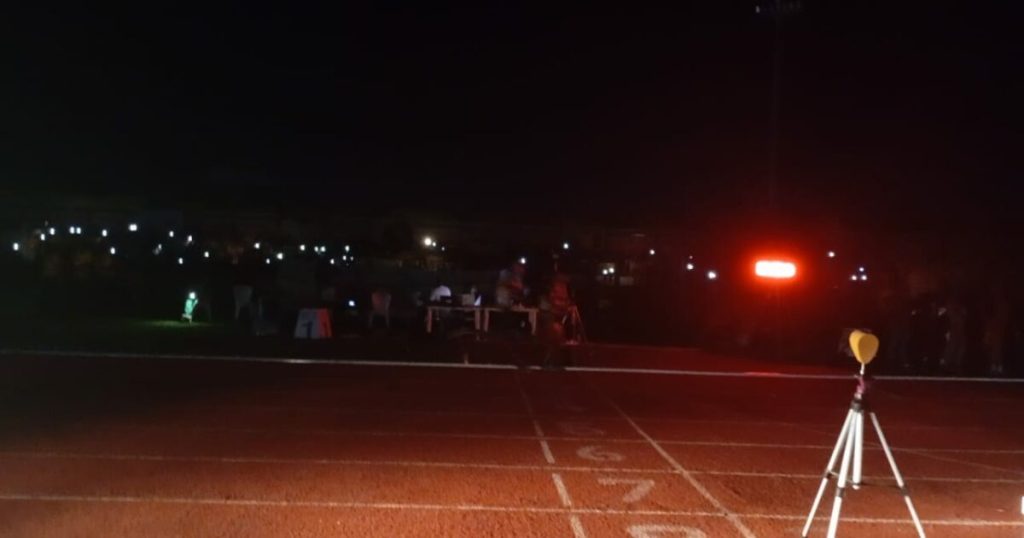The 2023 National Sports Festival in Abeokuta, Nigeria, witnessed a dramatic and controversial men’s 10km race final marred by a sudden power outage that plunged the MKO Abiola Stadium into darkness. Francis James, representing Plateau State, emerged victorious, crossing the finish line with a time of 30:36.50. However, his triumph was overshadowed by the unprecedented circumstances under which the race was concluded. With approximately eight laps remaining, the stadium’s floodlights unexpectedly failed, forcing the athletes to navigate the final stretch of the race in near-total darkness. This unforeseen event not only disrupted the flow of the competition but also raised serious questions about the preparedness and organization of the National Sports Festival.
James, while expressing gratitude for his victory, lamented the challenging and potentially hazardous conditions created by the blackout. He described the experience as disorienting and demoralizing, highlighting the difficulty of maintaining pace and strategy without being able to see the track or his fellow competitors. The sudden plunge into darkness forced him to rely on memory and instinct, significantly impacting his ability to gauge his position in the race and adjust his pace accordingly. He believed that the unexpected power outage ultimately cost him the opportunity to achieve a significantly faster time, estimating that he could have finished the race in the 28-29 minute range under normal lighting conditions.
The power outage, which lasted for approximately 20 minutes, exposed a glaring lack of contingency planning on the part of the event organizers. Despite the presence of high-ranking sports officials, athletes, coaches, and spectators, no immediate solution was available to restore lighting to the stadium. This failure to address the issue promptly not only disrupted the race but also cast a shadow over the entire event, raising concerns about the overall level of preparedness and professionalism. The lack of backup power or alternative lighting arrangements left athletes, officials, and spectators alike stunned and frustrated.
The incident served as a stark reminder of the importance of meticulous planning and robust contingency measures in the organization of large-scale sporting events. The failure to anticipate and address potential disruptions, such as power outages, can not only compromise the integrity of the competition but also jeopardize the safety of the participating athletes. The unexpected darkness forced runners to navigate the track blindly, increasing the risk of collisions and injuries. The lack of visibility also made it difficult for medical personnel to respond effectively in case of any emergencies.
In the absence of adequate lighting, quick-thinking fans and medical personnel stepped in to provide some level of illumination using mobile phone flashlights and the headlights of ambulances. This improvised solution, while commendable, underscored the lack of preparedness on the part of the event organizers. The fact that spectators and medical staff had to resort to such measures to ensure the safety and completion of the race highlighted a significant organizational oversight. The incident served as a wake-up call for organizers of future sporting events to prioritize contingency planning and ensure the availability of backup power and lighting systems.
Following the race, officials from the Athletics Federation of Nigeria (AFN) expressed their disappointment with the power outage and confirmed that they were still awaiting a formal explanation from the stadium management, the Local Organizing Committee (LOC), and the Ministry of Sports. The AFN’s statement reflected the broader sentiment of frustration and concern within the Nigerian sporting community. The incident raised questions not only about the technical capabilities of the stadium but also about the communication and coordination between the various stakeholders involved in organizing the National Sports Festival. The AFN’s commitment to seeking a full explanation underscored the need for accountability and transparency in addressing the shortcomings that led to the disruption of the men’s 10km final. The incident served as a valuable learning experience, highlighting the crucial role of meticulous planning, effective communication, and robust contingency measures in ensuring the smooth and successful execution of major sporting events.


